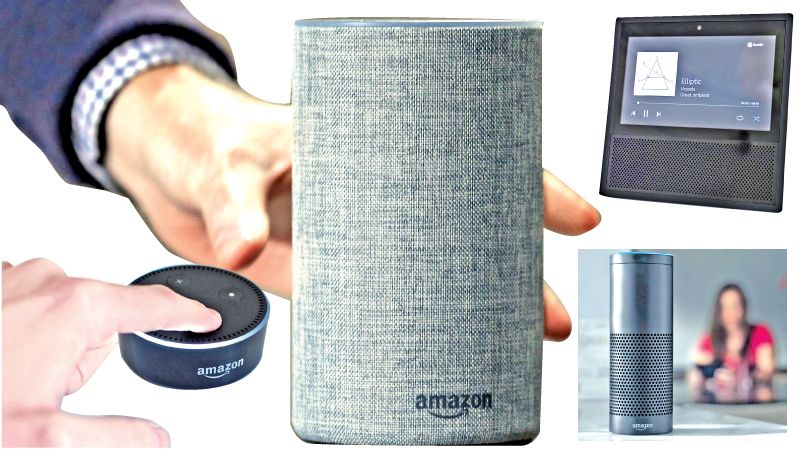Move over smartphones. The battle now raging between the big technology companies for consumer cash is focused on the voice-controlled smart speaker.
Having already conquered the pocket with the ubiquitous smartphone, big tech has been struggling to come up with the next must-have gadget that will open up a potentially lucrative new market – the home.
A pilot light was lit when Amazon’s Echo launched in 2014 and became a sleeper hit. Now the voice controlled smart speaker is rapidly becoming the next big thing, capable of answering questions, setting timers, playing music, controlling other devices about the home, or even potentially selling products.
“The last 12 months have been explosive for smart speakers, which have surged into the mass market for two reasons. Firstly, smart speakers have become the central control hubs of the smart home ecosystem,” said Ben Stanton, an analyst for Canalys. “Secondly, and most importantly, the price of smart speakers has fallen drastically.”
In the first nine months of 2017, 17.1m smart speakers shipped worldwide, according to Canalys’s data, but a further 16.1m were shipped in the last quarter of the year driven by Christmas present sales.
resulted in the price of smart speakers being slashed from £50 to as little as £30, which some put at cost or below for the manufacture of the devices, making them loss-leaders.
“This has not only brought in new first-time buyers, but also allowed tech enthusiasts to deck out their homes with several smart speakers,” said Stanton.
The trend towards smart speakers becoming mainstream is expected to continue. Canalys is forecasting 70% year-on-year growth with shipments reaching over 56m units this year.
Alexa’s latest home works as a digital photo frame, a small TV, a video-calling hub and is smart in the kitchen, making it more than just a novelty device
But smart speakers are also seeing good attachment rates, meaning that people con
tinue using them after the honeymoon period is over, not stashing them in a drawer never to be seen again like other passing fads in the gadget market.
While Amazon and Google duke it out to secure a voice-enabled beachhead within homes, notable laggards to the smart speaker revolution are Apple and Microsoft.
Apple, which has had a voice assistant in the form of Siri on its phone and computer devices for longer than anyone, announced its HomePod speaker in June. By November the company was forced to admit that it wouldn’t go on sale until “early 2018” because it needed “a little more time” before it was ready to ship.
Apple is pitching the £350 HomePod as music first, smart speaker second, but experts have speculated that it is Siri that is holding the device back. Since launching Siri, Apple has only been able to make incremental improvements to its voice assistant, which most believe is due to its lack of usage data. Microsoft has partnered with Samsung to make a speaker containing its Cortana assistant, but has failed to make a notable impact.
Where Google and Amazon have enormous troves of data to improve and refine their voice processing and interactions, Apple does not. The gap is evident even on the iPhone, where Google’s Assistant has near human-like natural language processing in the Google app, according to the company, while Apple’s Siri still struggles to understand people.
Some analysts also question whether anyone will buy a speaker from Apple that’s as much as four times mid-range models from Amazon and Google.
“Never write Apple off. Its base of loyal fans will flock to the HomePod,” said Stanton, adding that it is likely to make more profit than its rivals when it does launch HomePod. “But it will be a huge challenge to convince the average consumer to part with the cash required for a HomePod.”
Where Apple will not come close to challenging Amazon and Google in terms of volume shipped in 2018, he added.
While smart speakers are seen as the gateway to smart home gadgets and a potentially lucrative new market, profit from device sales are arguably not the primary driver for most of Amazon and Google’s smart speaker products. Instead, it’s about getting users into their ecosystem and making sure that it is their voice assistant that users interact with.
Voice is seen as the next big computing paradigm, the next step on from the smartphone, which in turn overtook the desktop computer.
Dave Limp, head of Amazon’s devices, said of the company’s Alexa, the intelligent personal voice assistant that provides voice interaction with its Echo devices: “We think of it as ambient computing, which is computer access that’s less dedicated personally to you but more ubiquitous.”
But big leaps in voice interaction will be few and far between, requiring enormous amounts of data for machine learning systems to crunch over for constant incremental improvements. If you do not already have skin in the game you could be left for dust.
In the immediate future device manufacturers are banking on voice-enabled devices ushering in a new era of smart homes controlled by the gadgets they sell.
“It seems every technology company under the sun wants to launch their own speaker for Alexa or Google Assistant. Many of these will fail, but the category as a whole will get stronger,” Stanton said.
At some point Amazon and Google will look to generate more revenue from their voice assistant user base, in the same way they might from smartphones or tablets. Amazon already allows users to buy things through Alexa on Echo devices. But straight retail is likely to form a small part of voice enabled revenue.
“We will also see a more explicit attempt from Amazon and Google to monetise smart speakers, perhaps by allowing adverts, or requiring a subscription for advanced functionalities,” said Stanton.
- The Guardian



Add new comment